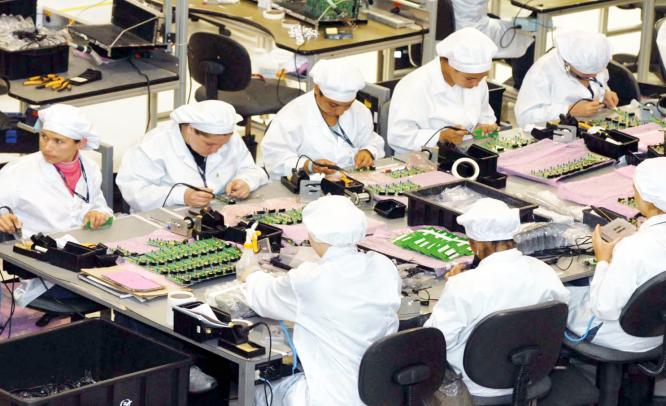Manufacturing proves to be a drag on broader economic growth as Brazil tries to come to terms with a drop in production for the second straight month, reports Team IFM
Rio de Janeiro, June 11: Brazil’s industrial production in April fell for the second month in a row, as output of capital goods and consumer durables dropped following rising inventories and higher costs of credit, official data published Wednesday stated.
Production dropped 0.3 percent over the previous month after contracting 0.5 percent in March, the national statistics agency, Brazilian Institute of Geography and Statistics (IBGE), said in Rio de Janeiro. A Bloomberg survey of 33 economists, however, estimated the decline a tad higher at 0.4 percent. Output went down 5.8 percent from the year before as against a 6.1 percent fall forecast by analysts.
The number represents a further step back for Brazilian industry after the March fall and adds to worries over the manufacturing sector’s negative impact on broader economic growth. Economists have been particularly worried about the recent increase in unwanted inventories, which has been brought about by a 2.3 percent rise in output in January from December.
The central bank’s hiking of borrowing costs over the past year to combat wayward inflation has left Brazilian industry sputtering, leading to a slide in business as well as consumer confidence. Also, economic troubles in Argentina, the country’s third largest trading partner, have hit the manufacturing sector very hard.
Analysts expect the currency to weaken by year-end, improving the outlook for exporters.
The Wednesday data “add to the building sense of concern in this sector,” Bloomberg quoted Daniel Snowden, emerging markets analyst at Informa Global Markets, as saying over the phone from London. “No matter what the government seems to do, no matter what the central bank seems to do, the sector just doesn’t want to put together any kind of consistent run. It’s been lifeless.”
CONSUMER GOODS
Output of capital goods fell 0.5 percent, IBGE said. Intermediate goods such as textiles and chemicals retreated 0.2 percent, their first monthly decline since December, while durable consumer goods such as furniture and home appliances sank 1.6 percent.
The one bright spot in April’s numbers was semi- and non-durable consumer goods such as shoes and food products, which rose 0.4 percent.
Manufacturers have been the weakest link in Brazil’s economy as they struggle with competition from abroad, high tax and labour costs, and poor infrastructure.
Of the 27 categories surveyed by the IBGE, 13 categories including metallurgy, wood products, clothing and furniture registered a decrease in output. The trend continues to point downwards, with annual average growth in industrial production inching down from -1.0 percent in March to -1.1 percent in April.
The three-month moving average of industrial production was down 0.2 percent in April, the IBGE said.
Industrial production, however, is expected to grow just 1.24 percent in 2014, less than the 1.50 percent expansion forecast for Brazil’s economy as a whole, according to a weekly central bank poll of about 100 economists.
A private survey has shown Brazil’s manufacturing shrank at the fastest pace in 10 months in May.
SWAP DEALS
The central bank held the benchmark Selic interest rate at 11 percent in its last monetary policy meeting, the first pause after nine straight increases and up from a record low of 7.25 percent in April 2013. Consumer prices in the year to April went up as much as 6.28 percent.
The bank also extended until the end of June a programme to auction swap contracts. Among other things, the programme buttresses the currency, thus holding down prices of imported goods.
After appreciating vis-a-vis major currencies but the US dollar this year, the real in the past week slipped 1.8 percent. Analysts surveyed by the central bank on May 30 forecast that the real will weaken to 2.40 per US dollar by year-end.
Brazilian exports to Argentina fell 18.6 percent to $6.2 billion in the first five months of 2014 from the comparable period a year earlier, the Trade Ministry said on June 2. Argentina purchased 6.9 percent of Brazilian exports in the period, down from 8.2 percent in the year earlier.
A stronger currency and the possibility of power rationing have coincided with a decline in industrial confidence, which fell in May to its lowest level in more than five years, according to the National Industry Confederation. Also, consumer confidence has plunged as Brazilians see their purchasing power eroded, falling last month to the weakest level in more than five years, according to a survey conducted by the Getulio Vargas Foundation.
The drop in industrial output was widespread, which “means we are really losing some steam,” Bloomberg quoted Roberto Padovani, chief economist at Votorantim Ctvm, as saying. Output of 43.7 percent of products grew in April, down from 59.5 percent in March, the statistics agency said.
Industry contracted 0.8 percent in the first quarter, following revised 1.7 percent growth in 2013, according to data the IBGE released May 30. That was the biggest drop since the second quarter of 2012. Investment meantime fell 2.1 percent, marking its largest decline in two years, while consumer spending fell 0.1 percent, the first drop since 2009.
Gross domestic product grew 0.2 percent in the first quarter, equivalent to an annual rate of 0.8 percent. Were it not for inventory accumulation and government spending, the economy would have contracted further, Bloomberg quoted Alberto Ramos, chief Latin America economist at Goldman Sachs Group Inc. (GS), as saying in a note to clients. The increase in inventories doesn’t bode well for second-quarter growth, he said.

